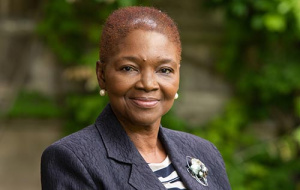Equality Act oral history project
 Baroness Valerie Amos, The Master, is being interviewed as part of the first comprehensive interdisciplinary history of the creation, trajectories, legacies and lived experience of the Equal Pay Act 1970 and Sex Discrimination Act 1975 (now the Equality Act 2010).
Baroness Valerie Amos, The Master, is being interviewed as part of the first comprehensive interdisciplinary history of the creation, trajectories, legacies and lived experience of the Equal Pay Act 1970 and Sex Discrimination Act 1975 (now the Equality Act 2010).
The University of Edinburgh, University College London (UCL) and the University of the West of England are partnering on this project. Funded by the Arts and Humanities Research Council, it will look at the period from 1964, when equal pay was first included as a commitment in a party manifesto, to 2020.
The research team includes Principal Investigator Louise Jackson, from the School of History, Classics and Archaeology at the University of Edinburgh, and Co-investigators Professor Hazel Conley (University of the West of England Bristol), Professor Fiona Mackay (University of Edinburgh), Professor Colm O’Cinneide (UCL Faculty of Laws) as well as a team of research fellows across the three institutions. 40 key actors will be interviewed including lawyers, litigants, campaigners, trade unionists and equality commissioners.
This project will be also the first to examine the history of responses to workplace sexual harassment including #MeToo. The project will examine gender’s intersection with other categories relevant to workplace inequality particularly race, ethnicity, religion and lifecycle.
Professor Jackson explained, “The reason why we thought this project was absolutely crucial – and crucial to do now – was because of the 50th anniversary of the Equal Pay Act, which was marked in 2020. We became very aware that despite the fact that these forms of legislation have been in place for 50 years, very little feels as though it has changed; the challenges associated with getting equal pay still hit the headlines on a regular basis. It raised the issue for us as to why, despite the passage of 50 years, there still seems to be such significant work to do.”
Professor O’Cinneide said: “At the present time, we see again the pressures for radical change; #MeToo, Black Lives Matter, a huge new focus on intersectionality, on breaking down discriminatory structures and attempting to transform society – all those lessons from 50 years ago become newly relevant again.”
You can find out more here.
Published: 7 October 2022
Explore Univ on social media
